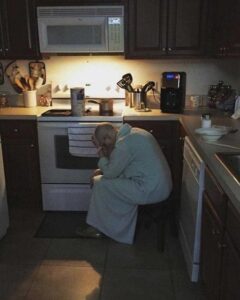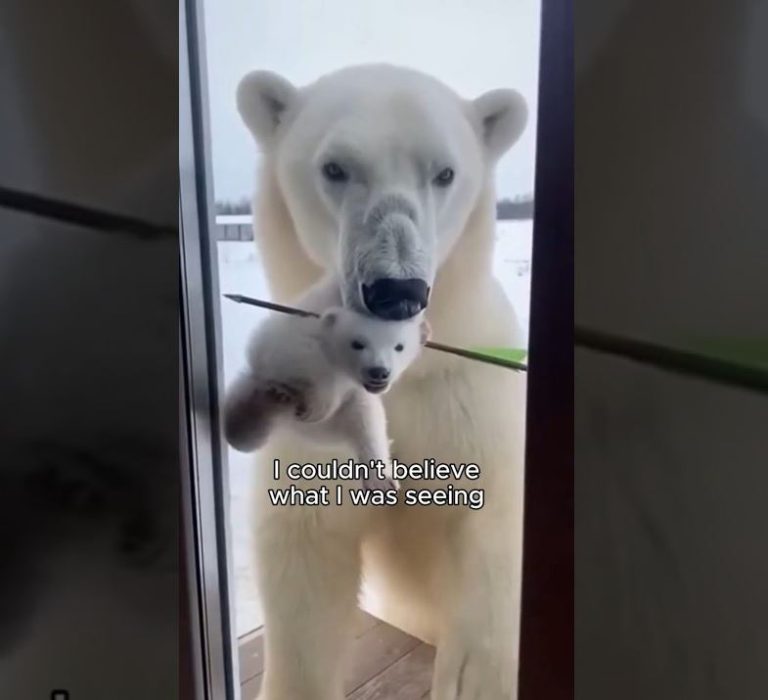It was just after 5 a.m. The house was completely still—the kind of quiet that feels heavy. I thought I’d get a head start on the morning and make some coffee before the usual rhythm of the day kicked in.
But the kitchen light was already on.
She was sitting on the stool near the stove, wrapped in her robe. Her head rested in her hands. The kettle hadn’t even started. A cereal box sat nearby, untouched.
She didn’t notice me at first.
I stayed still, watching her quietly. Her breathing was slow, and something about the moment felt full of unspoken weight.
Then I heard her whisper something—not to me, not loudly. Just… to the room.
“I don’t know how to keep pretending I’m not scared.”
It was the first time I’d ever heard her say something like that out loud. Not to anyone else—just to the quiet.
She slowly raised her head and looked at the empty chair across from her. And that’s when I realized…
She wasn’t talking to the room.

She was talking to someone she missed deeply. Her father. He used to sit in that exact chair every morning with a warm mug of coffee. He passed away a couple years ago. Quietly. Peacefully.
She still speaks to him sometimes. I never interrupt. But this time, it felt different—like she was waiting for him to answer.
I finally walked in, gently.
She turned and gave me a tired smile—the kind that says, *“I’m trying.”*
“Couldn’t sleep?” I asked.
She nodded. “Or maybe I slept too much. Hard to tell.”
I filled the kettle. Neither of us spoke for a while. The silence wasn’t uncomfortable. It was meaningful.
“I heard you,” I said softly.
She looked down at her hands. “Didn’t mean to say it out loud.”
“You can. You don’t have to hold it all in.”
She shrugged. “I just don’t want to worry anyone.”
“You’re not,” I said. “Talking about it is okay.”
The kettle began to hum. I made two mugs—mine, simple and strong; hers, sweet and warm, more milk than coffee.
When I set it in front of her, she paused, her hand hovering above the cup.
“My dad would’ve told me to stop moping,” she said with a faint smile. “‘Get up and go,’ he’d say.”
I chuckled. “He also cried at commercials about puppies. Don’t let him fool you.”
That earned a quiet laugh.
“He’d be proud of you,” I said.
She didn’t answer right away, just watched the steam rise from her mug.
“You think so?” she finally asked.
“I know so.”
Later that morning, she asked if I’d help her go through some old boxes. What I didn’t expect was that she meant his things—his old closet, untouched since he passed.
He had saved everything—receipts from the ’80s, scarves she knit as a teenager, even his slippers still by the door.
“Why now?” I asked as she folded one of his old sweaters.
“I think I need to make space for the life I still have,” she said. “Not just hold onto the one I lost.”
That stayed with me.
We found an old photo album near the bottom of a drawer. She turned each page slowly—birthdays, fishing trips, dance recitals.
Then she stopped.
A photo of her and her dad dancing in the kitchen. She must’ve been ten. He held her hands as she spun, her ponytail mid-air. She touched the picture like it was something fragile.
“He always made me feel like I could do anything,” she said quietly.
“You still can,” I replied.
Weeks passed. Some days were better than others. She was tired often, but she also pushed through, bit by bit.
And then something changed.
One afternoon, I came home and found the dining table covered in paper, brushes, and paints.
She looked up with a streak of blue on her cheek.
“I couldn’t sleep,” she said. “So I started painting.”
She painted trees, skies, and memories. She painted the chair her dad used to sit in. And then she painted herself—not as she felt, but as she wanted to feel: strong, peaceful, present.
When her care team saw the paintings, they encouraged her to share them at the local wellness center. She was hesitant at first, but eventually agreed.
A month later, her artwork was displayed at a small exhibit called *“Still Here: Art Through Healing.”*
People came. They smiled. Some even teared up.
She sold a couple pieces.
That night, she cried too—but this time, from relief.
“I feel like me again,” she said. “Even just a little.”
There was one painting she kept: a memory, imagined from her heart—her dad in his chair, her beside him, both smiling. She hung it in the kitchen.
And every morning since, she sits across from it with her cup of coffee.
“Still here, Dad,” she says softly.
And I sit across from her, grateful beyond words.
Because sometimes, the bravest thing isn’t never being afraid.
It’s choosing to show up anyway.
So if you’re reading this and walking through a hard season—know this:
You don’t have to be unshakable to be strong.
You just have to stay.
**Still here.**
**If this story moved you, please share it with someone who could use a little light today. And don’t forget to like—it helps others find hope when they need it most.**



